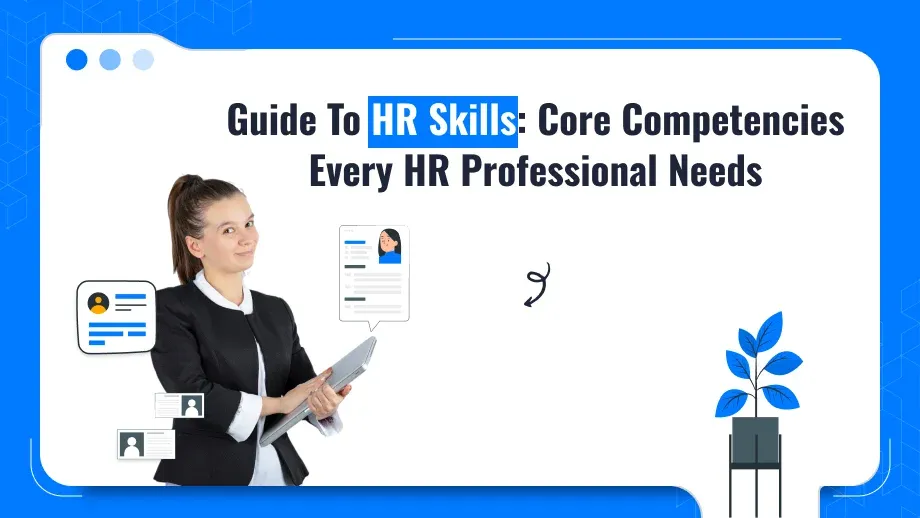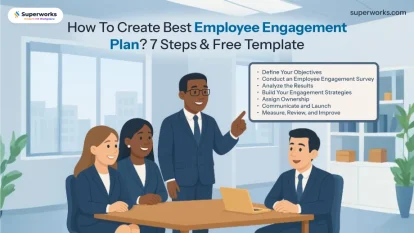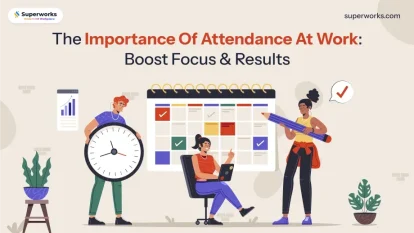
What are the core competencies to drive success in today’s human resources roles? With the increasingly dynamic HR landscape in today’s world, professionals require a combination of technical knowledge, strategic planning, and interpersonal skills to manage people effectively. Therefore, mastering such HR skills is quite crucial for professionals in human resource skills who wish to advance and positively impact their organization. For new learners, discussion of the Basics of HRM is a great step in understanding the foundational concepts and getting a solid skill base.
This guide explores the core and advanced HR skills every HR manager, recruiter, and executive should develop to excel in a dynamic work environment.
Core Skills Required for Every HR Professional
HR skills serve as the building blocks of a successful HR career. These skills apply to professionals across roles, from recruiters to top-level HR executives, creating a foundation that helps manage teams, improve communication, and ensure ethical practices.
- Communication skills: Proper communication is a skill that is required to be an HR professional. It helps in explaining policies and procedures to communicating feedback, which can foster trust and openness. Empathy and transparency are the root cause of any healthy work environment, and engagement flourishes there. Good communicators make bridges between the leadership and the employees and ensure that harmonious departments exist.
- Problem-solving: This is the ability to solve workplace problems. Whether a conflict or the optimization of processes, the HR professional must be able to resolve issues that help keep the organization running smoothly. In this regard, problem-solving is one of the skills that HR managers apply to predict challenges and solve problems proactively before they get out of hand.
- Ethics and Confidentiality: The indispensable qualities of HR are keeping things confidential and acting with high ethical standards. Because of the sensitive nature of information related to employees, it is a no-brainer about integrity and ethical accountability. Trustworthiness in the HR qualities on consistent ethical behavior that grows into a culture of openness and respect.
For those interested in how the profession responds to challenges that evolve, take a look at the Evolution Of HRM for changes in the focus of HR and changes in practice that exist today compared to yesterday.
Technical Skills of HR in Contemporary Workplace
It’s no longer possible for all aspects of HR technical skills to remain only manual in the contemporary workplace.
- HRMS and Payroll Systems: One must be proficient in HRMS Payroll Software in India. These applications allow for easier management of employee data, payroll, and benefits. This saves time and eliminates errors. For instance, India-based HRMS Payroll Software always provides systems that are aligned with the local payday and compliant payroll law.
- Data Analysis: Data-driven HR skill include analytics competencies. Analyzing workforce data contributes to informed decisions in HR and predicting future trends in hiring, training, and employee retention. Operating HR Analytics Projects equips a professional HR with experience in how to interpret data for optimization of workforce strategies and improvement of efficiency.
- The Applicant Tracking Systems (ATS): For the HR recruiter, an ATS is the key to streamlining and making the recruitment process run smoothly. Such an ATS automatically makes responses to applicants, organizes the candidate data, and allows recruiters to focus more on fit rather than paperwork. Being competent in the use of an ATS is one of the main technical HR recruiter skills a recruiter requires in today’s talent acquisition.
Mastery of these HR technical skills of the HR puts one into the position of an efficient, savvy resource, who can streamline operations while taking steps based on data.
Boost your team’s potential with the right HR Skills!
Companies with skilled HR see 2x growth in employee retention. Transform your HR approach with Superworks!
HR Manager and Executive Skills
While most HR manager skills have outgrown the mundane jobs of an HR professional, here are some of the skills that enable them to strategize and practice people-centric practices aligned with the business strategy.
- Strategic Planning: The strategic skill that an HR executive skills can avail of is the alignment of initiatives with company objectives. Good strategic planning successfully requires a very good understanding of what the company is aiming to achieve and its capability to foresee industry trends. These HR managers who think strategically make HR skills part of the company’s vision.
- Leadership and People Management: An HR manager has to develop teams for which he is responsible and for which he has to create a collaborative work environment. All these involve humanitarian skills such as empathy, delegation, and motivation to develop a workplace where employees feel stimulated to express their best.
- Analytical Thinking: Analytical thinking is the ability by which the HR manager is a data-driven decision-maker in anything to do with the workforce. Its result is based on metrics, allowing an HR manager to assess areas for improvement so that he or she can help guide the organization in optimum policies. This is especially crucial in large companies where workforce data is essential for performance evaluation and resource allocation.
For more information on the required skills for HR leaders in terms of driving business success, check out HR Competencies.
HR Skills in Recruitment and Talent Acquisition
Recruitment and talent acquisition requires specific HR skills of professionals to enable them to source the best performers in the organization. In industries where the competitive edge varies only by the quality of people an organization hires, recruitment becomes an important activity of organizations.
- Interview and Candidate Evaluation: A competent HR recruiter requires the ability to evaluate candidates fairly. He or she must check both his technical fit and cultural fit. Good interviewing skills include open-ended questions, probing into problem-solving capacity, and ascertaining how well the candidate fits with the company values.
- Candidate Sourcing: Skills HR recruiter skills like having a network, understanding of job boards, and usage of social media help HR teams source different and skilled candidates.
- Data in Recruiting: HR Analytics Projects provide really good insights into recruitment data. Recruitment trends such as time-to-fill, cost-per-hire, and diversity metrics enable the HR professional to optimize recruitment strategies for greater results.
Understanding HR Analytics Projects can therefore unlock the possibility for recruiters who want to streamline and enhance their processes to improve candidate experience, thus making recruitment a strategic business asset for the organization.
Soft Skills Every HR Professional Must Have
Soft skills are directly tied to HR roles. Soft skills are relevant to much better interpersonal relationships that tend to support workplace culture.
- Emotional Intelligence: One significant HR soft skills is recognizing and managing emotions. It is an essential attribute since high emotional intelligence implies empathy and enables the HR practitioner to get along well with others in the workplace. The skill builds trust, creates an open learning environment, and ensures safety in a gender-friendly workplace.
- Conflict Resolution: HR professionals handle and settle conflicts between employees. An ambassador in handling the problem, a neutral referee, and a fair solution epitomize solutions that will keep teams harmonious. One of the skills that support a healthy workplace, minimize disruptions, and foster a high degree of trust is the resolution of conflict.
- Adaptability: The landscape of the HR function is changing. That means adaptability will allow an HR practitioner to be effective in embracing new challenges from hybrid work models and the latest releases in HR software. Effectiveness in the midst of change and being proactive in organizational resilience can come only from adaptability.
For a better view of how these soft skills overlap with the principles of effective HR practices, refer to Human Resource Management.
Leverage Your HR Skills for Organizational Success
Essential HR skills in roles have much potential to drive organizational success through developing an engaged and motivated workforce.
- Talent Retention and Employee Engagement: High engagement and low turnover are often byproducts of good HR practices. Retention, continuous feedback, and development are core competencies driving employee satisfaction in this area and a more stable productive workforce flows from there.
- Performance Management: Good performance management involves constructive feedback giving, observable and measurable goal-setting with alignment towards data for tracking the employee’s progression. When the HR manages the performance well, then employee growth is developed, which in turn will lead him or her to achieving his or her specific goals, thereby improving the overall productivity of the team.
- Strategic Alignment with Business Goals: HR is aligned with people initiatives to business strategies. The skills developed by HR skills in support of efficiency, inclusion, and integration make a place of work that fosters productivity and loyalty.
To learn about the overall practices and trends of one of the world’s largest workforces, reflect on the insights about HR in India.
Future of HR Skills: Emerging Trends and Technology
With change in the way work is conducted and technology in itself, it falls to HR professionals to stay ahead of these changes-for example, AI and hybrid work models stay ahead in their organizations.
- AI and Automation: With AI, many functions of HR have undergone drastic changes with recruitment through to engagement. Routine tasks can be automated now for the HR to be strategic in assignments such as workforce planning and employee development.
- People Analytics: Data analysis is a critical function within the entire HR function now, ensuring that they make as informed decisions as possible with hiring and talent retention in addition to better employee care. Analytics help HR act early, noticing patterns before they develop into problems.
- Skills required for working in remote and hybrid teams: Shifting trend of working: As the workforce is shifting toward remote working, HR professionals also have to adapt to new changes. Digital skills of communication, management of virtual teams, and employee morale requirements now add to the skill set of HRM skills.
HR professionals in India can use HR software India to keep the complex payroll process sorted and compliance easy with the local laws, which would easily enable them to keep the regional requirements of their organizations addressed.
Conclusion
Mastery in the combination of foundational and advanced HR skills enables the HR professional to face not only existing but also emerging challenges. From technical mastery of the concepts related to HRMS data analysis to soft skills like handling HR expert conflicts and adaptability, they need to acquire that sort of competency To be effective at work in a career related to HR career. Continuous learning and development are the keys to relevance and positive contributions to organizations today.







